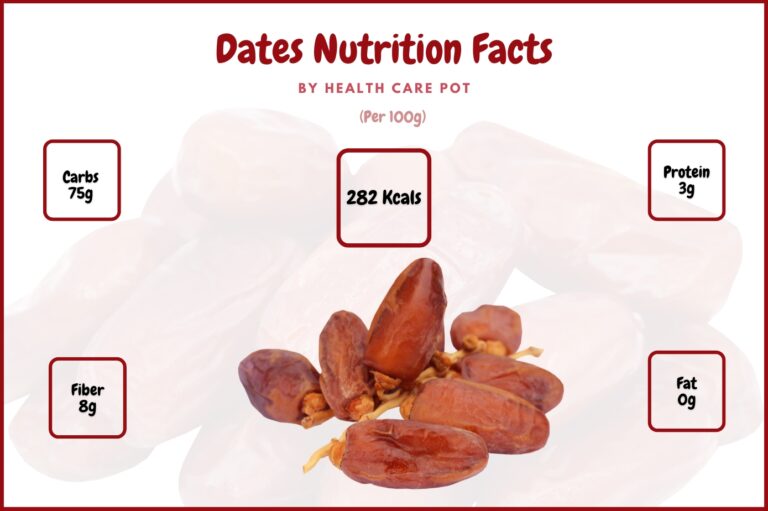Dates are rich sources of carbohydrates. It is a super nutritious fruit found almost all over the world.
Dates are mostly produced in Egypt (statics from 2021). The date's scientific name is 'Phoenix dactylifera'. It is used commercially for making cakes, chocolates, bars, desserts, and sauces.
Dates Nutrition Facts
Here below table shows the dates nutrition facts 100g.
Serving size 100 g
Servings per container 1 Calories from Fat 0 * Percent Daily Values are based on a 2,000 calorie diet. Your daily values may be higher or lower depending on your calorie needs.Nutrition Facts
Amount per serving
Calories 282
% Daily Value*
Total Fat 0g
0%
Saturated Fat 0g
0%
Trans Fat 0g
Cholesterol 0mg
0%
Sodium 2mg
1%
Total Carbohydrate 75g
25%
Dietary Fiber 8g
32%
Sugars 63g
Protein 3g
About 100 grams of dates have 282 Kcals, 0 grams of fat, 75 grams of carbohydrates, and 3 grams of protein.
There is no cholesterol in the dates. It holds 2 mg of sodium.
Calories:
100 grams of dates have 282 Kcals(1180 kJ). Most of the calorie comes from carbohydrates.
100 grams of dates own 75 grams of carbohydrates, 8 grams of fiber, and 63 grams of natural sugar. In 100 grams of dates, Net carbs(Total Carbs-Fiber) should be 67 grams.
63 grams of sugar include:
Sucrose 23g
Glucose 20g
Fructose 20g
Dates don't contain fat(or contain less than 0.5g).
100 grams of dates contain 3 grams of protein.
Glycemic Index:
The glycemic index of dates is between 35 to 55. It holds a low glycemic index.
Vitamins And Minerals In Dates
Vitamines | Content | Minerals | Content |
|---|---|---|---|
Vitamin C | 0.4 mg | Calcium | 39 mg |
Vitamin A | 0 mcg | Phosphorus | 62 mg |
Vitamin E | 0.05 mg | Potassium | 656 mg |
Vitamin K | 2.7 mcg | Iron | 1.02 mg |
Vitamin B1 | 0.052 mg | Magnesium | 43 mg |
Vitamin B2 | 0.066 mg | Zinc | 0.29 mg |
Vitamin B3 | 1.27 mg | Copper | 0.206 mg |
Vitamin B6 | 0.165 mg | Manganese | 0.262 mg |
Vitamin B9 | 19 mcg |
100 grams of dates can have Vitamin C(0%), Vitamin A(0%), Vitamin E(0%) and Vitamin K(2%) of your RDA(Recommended Dietary Allowances).
Vitamin C enhances immunity; Vitamin A benefits your heart, lungs, and other organs to work properly; Vitamin E conserves healthy skin and eyes; and Vitamin K is necessary for blood clotting and healthy bones.
Dates also have an adequate amount of B vitamins. 100 grams of dates can have Vitamin B1(thiamin) 4%, Vitamin B2(riboflavin) 5%, Vitamin B3(niacin) 8%, Vitamin B6 (pyridoxine) 12%, and Vitamin B9(folate) 5% of your RDA(Recommended Dietary Allowances). These vitamins require for digestion and proper nerve function.
Minerals are also needed for the body's health. Let's check its portion value.
100 grams of dates have Calcium 3%, Phosphorus 2%, Potassium 33%, Iron 7%, Magnesium 10%, Zinc 3%, Copper 23%, and Manganese 11% of your RDA (Recommended Dietary Allowances).
Calcium supports our bones; Phosphorus plays an essential role in inventing DNA and RNA; Potassium controls fluid balance; Iron lowers tiredness and fatigue; Magnesium maintains muscle, nerve function, and energy production.
Zinc plays a significant role in building proteins; Copper makes red blood cells; Manganese supports the body in creating connective tissue, bones, and blood clotting factors.
Dates Benefits:
Dates benefits for skin:
Dates are rich in potassium and copper. A potassium-rich diet has lots of health benefits. Potassium can control fluid balance, hydrate the skin, and promotes faster cell renewal.
Copper plays a notable role in the coordination and balance of skin proteins.
Dates benefits for hair:
Copper can boost collagen and elastin by increasing fat cells on the scalp. It can improve the thickness of the hair and promotes hair growth. A copper insufficiency might activate hair loss and premature gray hair.
Comment down your suggestions and queries in the comment section. We will love to hear from you.
Frequently Asked Questions(FAQ):
Yes, due to its high amount of potassium and copper, it can boost skin brightening.
Dates have properties that can improve the thickness and growth of the hair.
Definitely, yes, but in moderation.
They are not so rich but have a sufficient amount of iron. 100 grams of dates contains 1.02 mg of iron.

